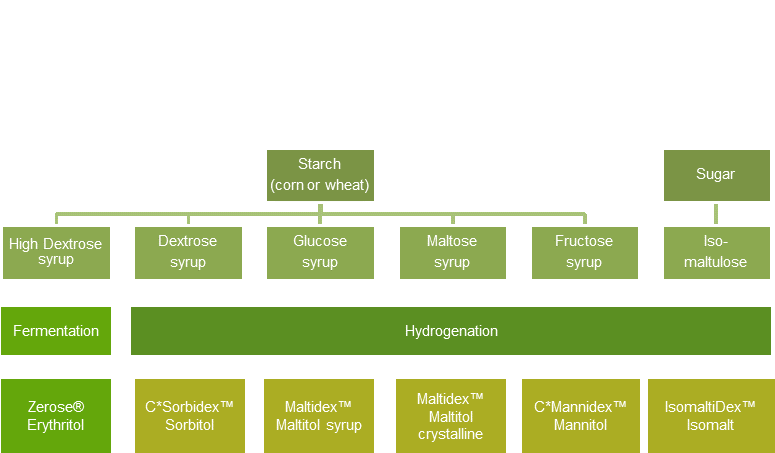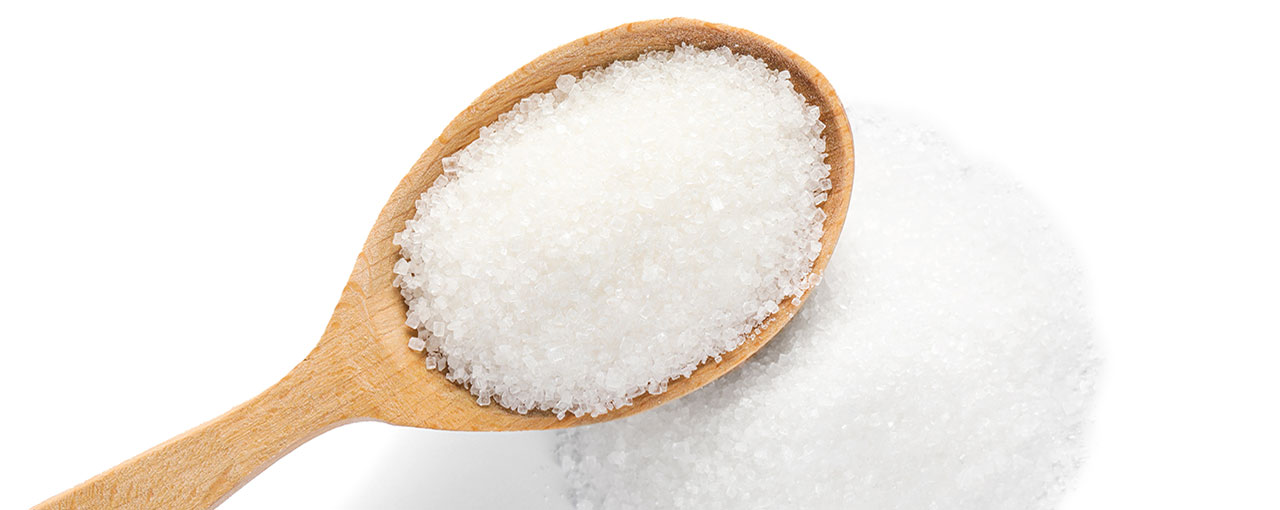Low/No Calorie Sweeteners
As reducing sugar consumption has become a global concern, consumers are actively seeking out foods and beverages with less sugar – but few are willing to give up the satisfaction of sweetness.
Polyols – also known as sugar alcohols (although they are not a sugar, nor an alcohol) – can be an excellent solution. These versatile sweeteners offer the potential for great-tasting reduced-sugar and sugar-free products, while contributing important sensory and functional benefits.
Benefits
- Ideal for sugar & calorie reduction: Since they are only partially metabolized and absorbed, the caloric value is lower than that of other sugars (2.4 kcal/g vs 4.0 kcal/g). Erythritol is the exception with zero calories!
- Bulking properties: Polyols help to bring back lost texture and mouthfeel when reducing sugars.
- Clean, sugar-like taste: Can be used in combination with high-intensity sweeteners as their clean sugar-like taste helps to mask off-flavors.
- Supports oral health: Non-cariogenic so they do not contribute to caries or tooth decay.
- Excellent processing stability: Withstanding severe acid and heat conditions during processing.
Most polyols occur naturally in a variety of food products like vegetables, fruits and mushrooms. They are also regularly present in fermented foods like wine or soy sauces. Polyols are therefore a normal constituent of the human diet.
Product offer
Sorbitol
Obtained by the hydrogenation of dextrose, sorbitol is the most used polyol.
- Cost-effective solution
- Mild relative sweetness (60% of sucrose)
- Good humectant, helping to keep products soft & moist
- High solubility, balancing and stabilizing elasticity and mouthfeel
Available in powder and liquid format
Applications
Production Process
Although most polyols are present in nature, e.g., in fruits and vegetables, their extraction is not a viable production method.
- Polyols (or polyhydric alcohols) are obtained by the hydrogenation of sugars, derived from corn or wheat starch (maltitol, mannitol, sorbitol) or cane or beet (isomalt).
- Erythritol is the first polyol to be industrially manufactured by a fermentation process.
-
Polyols can be available in powder form (via crystallization), and some are also available in liquid (isomalt, maltitol, sorbitol) form.

EU Labelling
Regulation (EC) No 1333/2008 on food additives and amendments regulates the use of food additives which are used
- to impart a sweet taste to foodstuffs
- as tabletop sweeteners.
Its annex II contains a list of foodstuffs in which polyols can be used, at quantum satis level. The use is, in most cases, restricted to foodstuffs which are either "energy-reduced" or manufactured "with no added sugars".
Definitions (for the purpose of this Regulation)
- "with no added sugars": without any added mono- or di-saccharides or any added foodstuff containing mono- or di-saccharides which is used for its sweetening properties
- "energy-reduced": with an energy value reduced by at least 30 % compared with the original foodstuff or a similar product
Labelling – Regulation (EU) N° 1169/2011 on the provision of food information to consumers
- Foodstuffs containing any polyols must carry a label "with sweetener(s)"
- Foodstuffs containing both an added sugar or sugars and any polyols must carry a label "with sugar(s) and sweetener(s)"
- Foodstuffs containing more than 10 % added polyols must carry a label "excessive consumption may produce laxative effects"
All Cargill’s polyols also comply with Commission Regulation (EU) N°231/2012 and amendments laying down specifications for food additives listed in Annexes II and III to Regulation (EC) N° 1333/2008 for use in foodstuffs.
Sustainability
We source certified corn and wheat, benchmarked at Silver level according to Farm Sustainability Assessment*. This industry-recognized benchmark system supports good agricultural practices in key sustainability areas, including:
![]()

